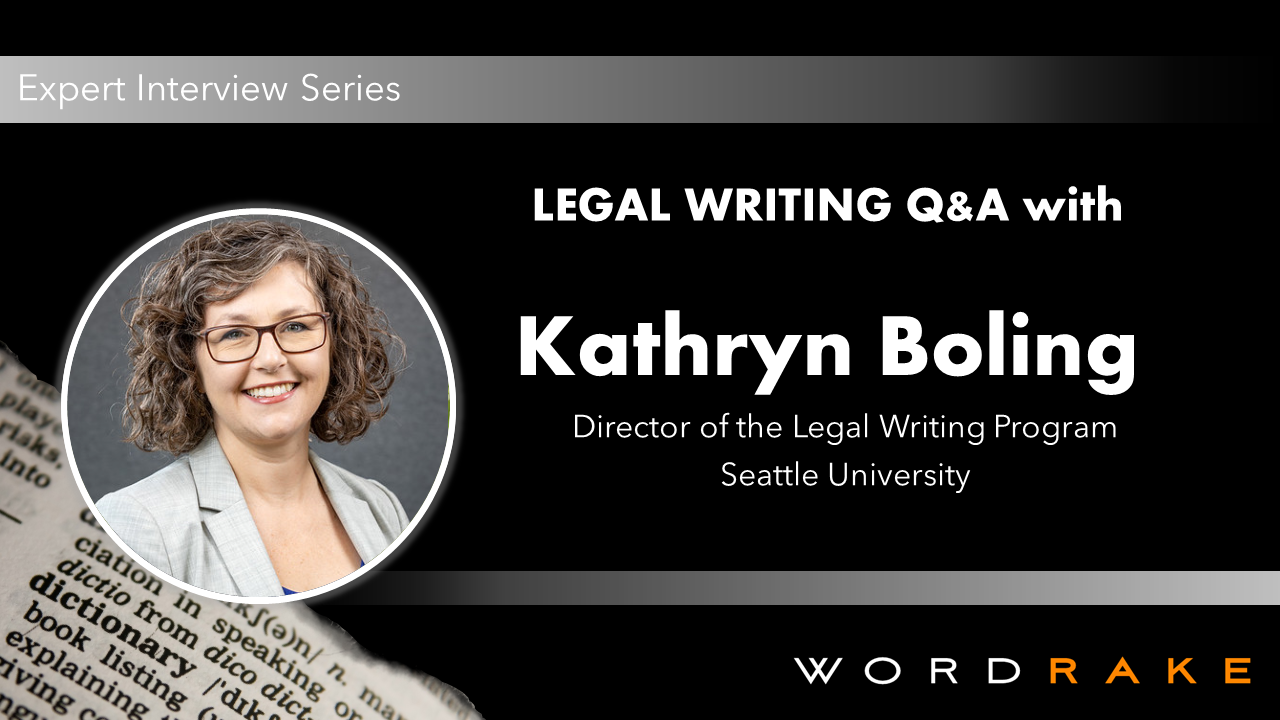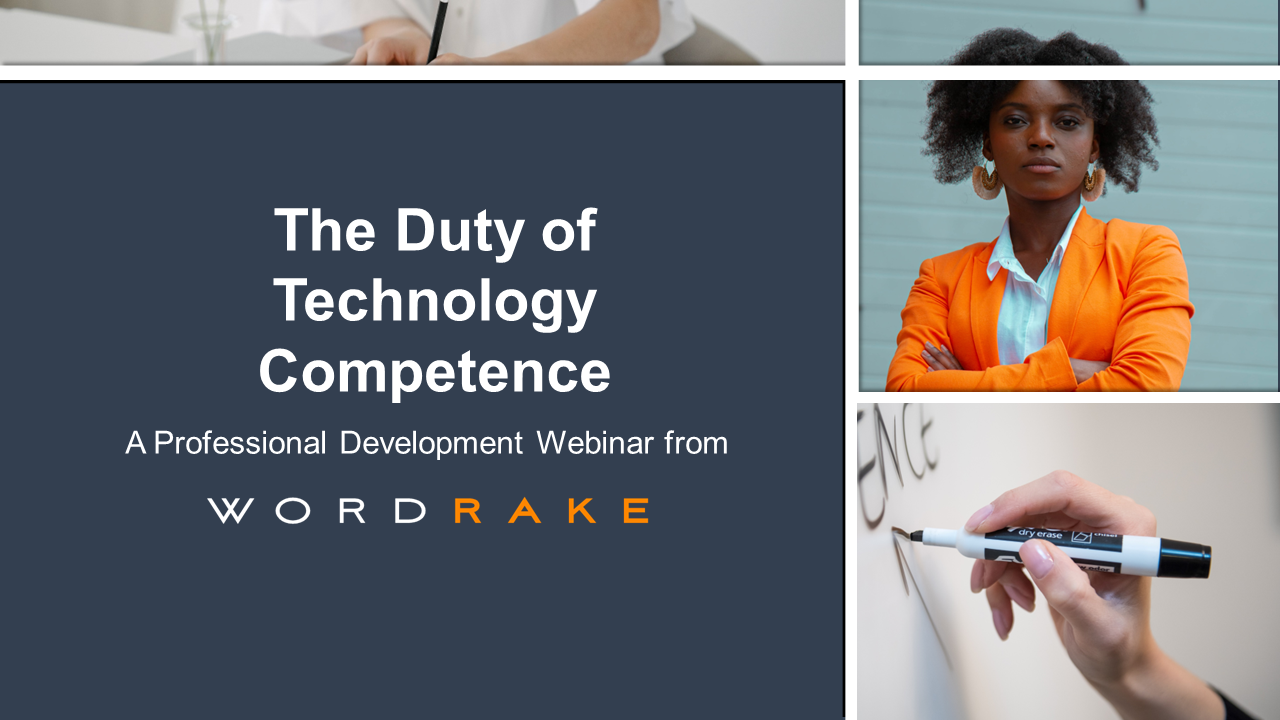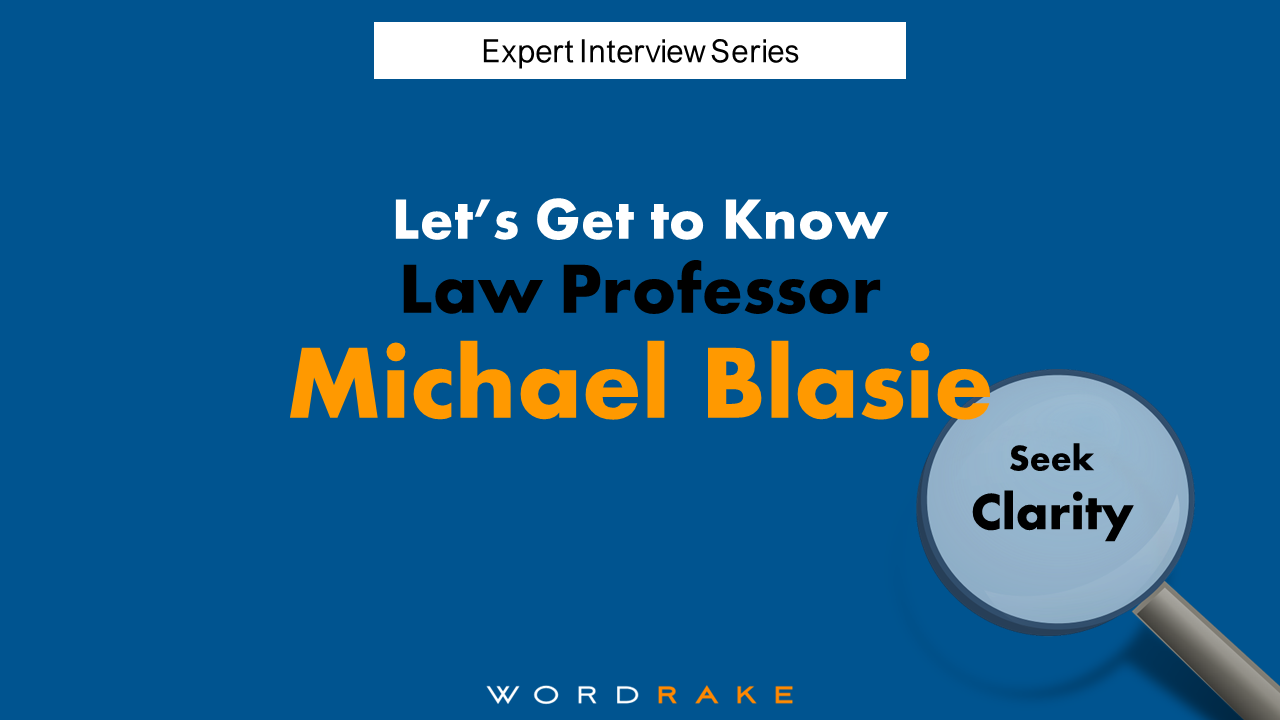Legal writing is its own discipline, with its own conventions. While the process of learning this complex skill and weaving it into part of your professional identity is a daunting one, Kathryn Boling, Director of the Legal Writing Program and Seattle University thinks it's rewarding experience. She shared her perspective with us.
What are the top 3 to 5 characteristics of good legal writing?
One primary characteristic of good legal writing is precision, both with language and with content. Precision means that every word and phrase is chosen carefully for its meaning and tone because the writer understands that their document is likely constructing the reader’s understanding of a situation from scratch. For that reason, precise writing is also accurate and clear. Beyond these characteristics, I often tell my students that good legal writing has to do with the writer’s ability to balance various tensions that are built into the genre. The classic example is that legal writing should be both comprehensive and concise. In other words, the best legal writing takes just the right amount of space to be understood and satisfy the reader’s curiosity, no more and no less.
What is the most frustrating part about becoming a good legal writer? How do you overcome it?
What is most frustrating about becoming a good legal writer varies a lot from person to person depending on their background. That said, I would say that in the big picture, the most frustrating thing about it is the sheer breadth of things you can do “wrong” and thereby fail to accomplish the goals of your document. In our classes we talk about the three main purposes of legal writing being to explain, to persuade, or to memorialize. Any one of those goals can be thwarted by errors in every step of the process, from early research (e.g. the omission of an important case) to outlining (e.g. missing an important argument) to editing (e.g. an awkward word choice or a misplaced comma in an important sentence). On top of that, legal readers are multifaceted humans with pet peeves, biases, and moods that can sometimes be triggered by aspects of your writing style that may be harmless in another’s eyes. For example, some lawyers who review job applications will simply toss submissions that have grammar or punctuation errors in the cover letter. I have become convinced that part of becoming a good legal writer is making peace with the unpredictable yet intense scrutiny of one’s work.
Legal writing is often judged harshly because it is a proxy for legal thinking. Do you agree with this thinking? Why or why not? Is this still a fair assessment in the age of generative AI?
I do tend to view legal writing as a proxy for legal thinking, yes. Words are our work as lawyers. Not only is the law itself made of words, but exchanging words with others is the only means lawyers have to resolve our client’s problems. We use language to gather facts, to negotiate, to advise, to explain, and to persuade; these are the tools in the lawyer’s toolbox. And, for better or worse, much of this is done in writing. The worst thing we can do when practicing law is to be passive or careless about our writing because the mistakes we make add disorder and chaos to a client’s problems, and we should be doing the opposite. Generative AI can help us be more effective in some ways, particularly with speeding up some aspects of the writing and “thinking” process (e.g., brainstorming arguments, creating first drafts, editing). Nonetheless, these tools will never allow lawyers to be fully passive about their writing, as we have seen in the unforgiving press coverage of lawyers who over-relied on generative AI in the last couple years.
How can legal writers improve their ability to accept and incorporate editing feedback?
I like to start my first-year legal writing class with a description of legal practice as a web of important relationships between common players including the client, the lawyer, the client’s “opposing” party and their lawyer, and the deciding judge (real or hypothetical). Most lawyering tasks involve trying to get one of these players to do something, and our work is judged by our success in that endeavor. That is why legal writing must always be reader-focused; we should always be trying to get into the reader’s head to give them what they need to buy into what we want them to do. If one has that mindset about legal writing, then feedback is very helpful! Good feedback gives you additional perspectives and insights on whether your communication is going to “work” on the intended reader.
Some say that legal writing is its own “discourse community.” What does this mean to you? How might that make learning to write well more difficult?
Legal writing (by which I mean practice-based legal writing by lawyers and judges) is absolutely its own “discourse community.” The legal system has its own broad goals (usually justice of some kind), and the practitioners who work in it have their own rules and conventions about how to communicate with each other. I love this about our community. Even though the acculturation process is disorienting at first, lawyers really can find a meaningful sense of belonging for themselves in the law when they become known as a competent participant in that discourse. The problem that can come up is that lawyers sometimes start to “coast” a bit once they are finally seen at that “competent” level; they stop learning and growing, which is a shame.
When lawyers are pressed for time, what 3 things should they focus on getting right in their writing?
- Identify three things that this document needs to accomplish (for example: winning the motion, memorializing an agreement, building rapport, increasing or decreasing a sense of urgency).
- Write an introduction that demonstrates or states those goals as directly as is appropriate.
- Outline the body of the document to have strong paragraphing, including topic sentences that advance those goals and make the document easy to skim.
How do you think about AI and Legal Writing? Is there an ethical way for legal writers to use AI in their practice?
I do believe that there is an ethical way for legal writers to use AI in their practice, and it has everything to do with keeping intellectual ownership over every aspect of the writing that is ultimately submitted to the reader. In other words, the representations about law and fact must be verified, the assertions must be tested using the writer’s knowledge and judgment, and the writing decisions made by the AI (organizational and sentence-level) must be identified and compared to other options that might serve the document’s goals better. With current AI products and certain types of documents, doing these tasks may very well be faster than writing from scratch, and that is great.
About Kathryn Boling
Kathryn Boling is the Director of the Legal Writing Program and an Assistant Professor of Law at Seattle University School of Law. She primarily teaches the first-year legal writing course, “Legal Writing, Skills, and Values,” which teaches objective legal writing as well as introducing students to foundational lawyering skills like client interviewing, client counseling, negotiation, and fact development. She is passionate about taking full advantage of the course to expose students to the realities, skills, difficulties, and joys of practicing law in the first year of law school. She has spoken at multiple conferences about her people-centered approach to teaching legal writing, including best practices for teaching reflection and professionalism. She also researches and writes about quotation practices in the law.
Professor Boling studied cultural and social anthropology for her Bachelor of Arts at Stanford University, focusing her studies on globalization and law. She attended Seattle University School of Law for her J.D., graduating summa cum laude in 2007. She spent her first two years after graduation as a judicial law clerk to Judge David Armstrong on the Washington Court of Appeals. From there, she was hired through the DOJ Honors Program to be a Trial Attorney in the Civil Division of the U.S. Department of Justice in Washington, D.C. At DOJ, Professor Boling litigated complex tort cases around the United States that arose out of environmental contamination. Missing Seattle, however, Professor Boling moved back in 2013 and joined a private civil defense firm where she spent nearly six years litigating insurance coverage and bad faith matters. In 2019, she began teaching legal writing full-time as a visiting professor, and in 2022 she began serving as the program’s Associate Director. In 2024, she joined the career faculty on the tenure track and took on the director role for the Legal Writing Program.
About the Legal Writing Interview Series
WordRake founder Gary Kinder created the software to help legal writers edit for brevity and simplicity. In continued dedication to the most effective legal writing, this Series highlights the experience and advice of experts from professors to writing coaches to litigators. Looking to help boost your legal writing skills? Get a free 1-week trial of WordRake here.








